Ukraine has a new Defense Minister, Mr. Hun Manet plans to visit Brunei, German Chancellor calls for something... are some notable international news in the past 24 hours.
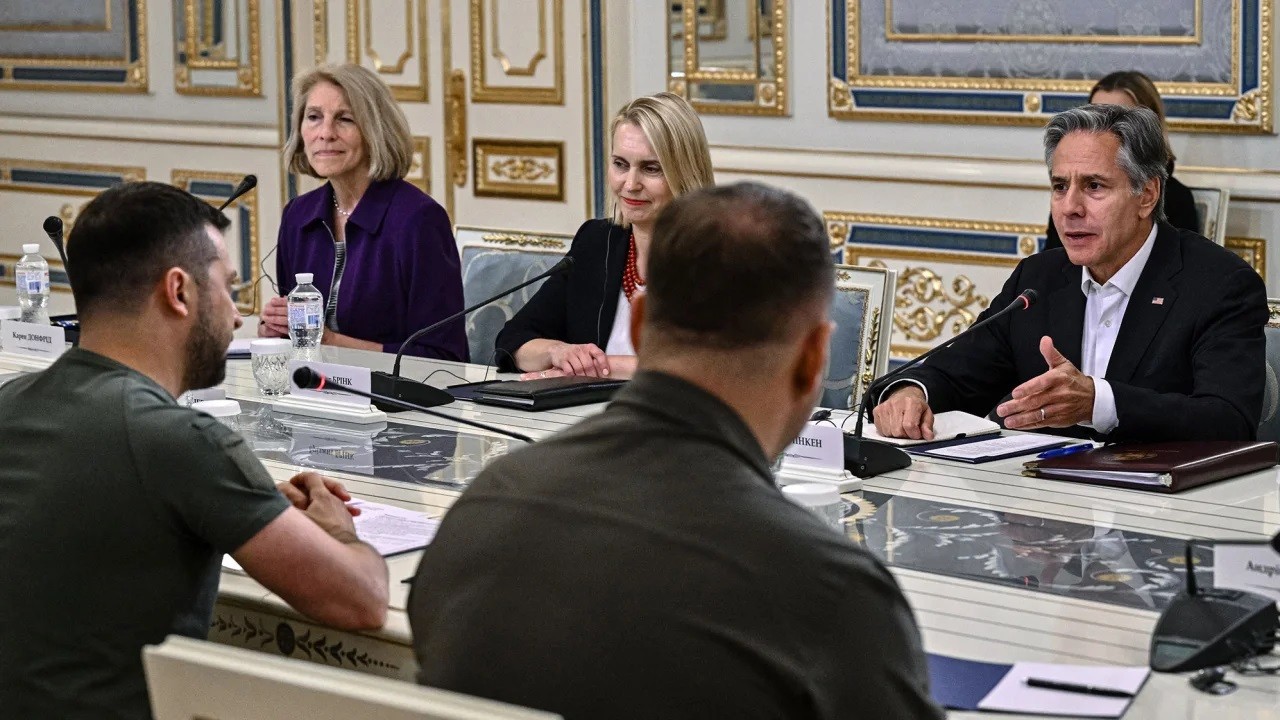 |
| US Secretary of State Antony Blinken meets with Ukrainian President Volodymyr Zelensky on September 8 in Kiev. (Source: AFP/Getty Images) |
The World & Vietnam Newspaper highlights some of the day's international news highlights.
* Ukrainian army attacks southwest of Donetsk: On September 5, writing on Telegram , deputy commander of the Guards of the self-proclaimed Donetsk People's Republic (DPR) Alexander Khodakovsky said: "The largest activity is observed in the area of the village of Novodonetskoye. There are attempts to break through with the use of a large number of armored vehicles. Fierce clashes are taking place on the outskirts of Novodonetskoy."
According to him, the Armed Forces of Ukraine (VSU) have been shelling Russian military positions “almost around the clock” for several days, rendering minefields “ineffective” and preventing engineers from laying new mines. In addition, the VSU’s “intensive artillery fire” has “a psychological impact on the soldiers.”
According to the official, Ukraine is using similar tactics in Novomayorsk. (TASS)
* Russian official : Ukraine used Australian drones: On September 5, Russian Foreign Ministry spokeswoman Maria Zakharova said: "It turns out that Australian drones were indeed used to attack targets in Russia."
According to her, Australia has “enthusiastically contributed to the anti-Russian campaign directed by Washington”, while concealing from public opinion “the undeniable situation that shows Australia is increasingly being drawn into the conflict”. (TASS)
* Ukraine claims to have collected valuable data from a Russian Mi-8 helicopter : On September 5, spokesman for the Ukrainian Military Intelligence Service (GUR) Adriy Yusov said that the country had conducted a special operation with the participation of a Russian Mi-8 helicopter pilot who defected to the Ukrainian side.
According to Mr. Yusov, the GUR operation has caused a stir not only in Ukraine but also beyond its borders. He stressed that this is a “truly important and complex operation, which is of vital importance for the defense and security of Ukraine, and will have long-term consequences for the morale and defense and security of the enemy. Thanks to this operation, the GUR has collected extremely important intelligence about the Russian air force, as well as many other details that will help Ukraine protect its airspace and destroy the enemy.”
Previously, on August 23, Major General Kirilo Budanov, Director of the GUR, confirmed that the agency had completed a special operation, in which a Russian Mi-8 AMTSh helicopter carrying fighter jet parts and the entire crew entered Ukraine and surrendered to the Ukrainian armed forces. (Vietnam News Agency)
* Ukraine has a new Minister of Defense : On September 6, the Ukrainian Parliament voted to approve the appointment of Mr. Rustem Umerov as the new Minister of Defense.
On Telegram , MP Yaroslav Zheleznyak said that an overwhelming majority supported Mr. Umerov to become the new defense minister after he was nominated by Ukrainian President Volodymyr Zelensky. This is the biggest change in Ukraine's defense sector since the conflict broke out in February 2022. (Reuters)
* Ukrainian officials oppose elections amid conflict : Speaking at the Kiev Security Forum on September 5, Secretary of the National Security and Defense Council of Ukraine Oleksiy Danilov emphasized: “Elections are a very difficult issue. Holding elections in the current conditions of our country causes internal instability. Why? Because elections are primarily about competition between platforms, big debates and finding the direction of the country, because we are talking about parliamentary and presidential elections. Imagine how such discussions will take place in the current period?”
Earlier this year, US Senator Lindsey Graham visited Ukraine and urged President Volodymyr Zelensky not to postpone the planned elections. The official also urged all Ukrainian allies to help the country hold elections in 2024.
In late August, President Zelensky expressed his desire for Ukraine to hold presidential and parliamentary elections in 2024, provided that the Ukrainian parliament makes legislative changes to allow elections under martial law, as well as if the United States and Europe provide financial support and international observers are present. (Sputnik)
* US Secretary of State visits Ukraine: On September 6, Mr. Antony Blinken made an official visit to Kiev. According to the website Strana.ua (Ukraine), traffic was congested in the center of the capital Kiev.
Mr Blinken’s first stop was at a military cemetery, where he laid a wreath in memory of fallen Ukrainian soldiers. He then met with his host counterpart, Dmytro Kuleba, who said he was “struck by the extraordinary courage and resilience of Ukraine”.
Commenting on the progress of Ukraine's counteroffensive, he said: "We have seen some positive steps from the counteroffensive. That is a good thing. We want to make sure that Ukraine has what it needs, not only for the counteroffensive to be successful, but also to make sure that it has a strong enough deterrent so that... this (conflict) does not happen again."
Shortly after, Secretary of State Blinken also met with host country President Volodymyr Zelensky. In February, US President Joe Biden visited Ukraine and held talks with Mr. Zelensky. (Reuters)
| RELATED NEWS | |
| Russia-Ukraine conflict: President Putin says 'never refused to negotiate', Mr Zelensky visits Donetsk | |
Southeast Asia
* Cambodian Prime Minister plans to visit Brunei: On September 6, AKP (Cambodia) reported that Cambodian Prime Minister Hun Manet is expected to make an official visit to Brunei Darussalam in the near future. According to AKP, Prime Minister Hun Manet will visit Brunei at the invitation of Brunei's King and Prime Minister Sultan Haji Hassanal Bolkiah Mu'issaddin Waddaulah. The two sides held a bilateral meeting on the morning of September 6 in Jakarta (Indonesia), on the sidelines of the 43rd Association of Southeast Asian Nations (ASEAN) Summit and related summits. However, the detailed plan and schedule of the visit have yet to be determined.
During the bilateral meeting, the leaders of the two countries discussed the future direction of the relationship, focusing on defense, security, education and human resource training, agriculture, and people-to-people exchanges. The leaders of the two sides also agreed to strengthen cooperation between the two countries in preventing cross-border crimes, connecting the private sector through the Chamber of Commerce, and supporting the implementation of the bilateral dialogue mechanism between the two foreign ministers.
On the same morning, the Cambodian Prime Minister met with the Founder and Executive Chairman of the World Economic Forum (WEF) - Professor Klaus Schwab. Prime Minister Hun Manet appreciated the WEF for clearly demonstrating Cambodia's achievements and potential in the international arena. At the same time, he welcomed the WEF's plan to strengthen cooperation with ASEAN, including Cambodia. Prime Minister Hun Manet emphasized the consistency and coherence between the WEF's agenda and the Royal Government of Cambodia's "Pentagon Strategy - Phase I", especially in terms of private sector development and digital economic and social development. (AKP)
| RELATED NEWS | |
| Bustling diplomacy of Cambodia's new Prime Minister | |
Northeast Asia
* China urges major countries to “oppose a new Cold War” : On September 6, in his opening speech at the ASEAN+3 Summit in Jakarta (Indonesia), Chinese Premier Li Qiang said: “Disagreements and disputes may arise between countries due to misunderstandings, divergent interests or outside interference. To control disagreements, what is needed now is to oppose the policy of choosing sides, oppose confrontation between blocs and oppose a new Cold War.” (AFP)
* Japan wants to build stable relations with China : Japanese Prime Minister Fumio Kishida said in a brief meeting with his Chinese counterpart Li Qiang on September 6 that the two countries need to build a “constructive and stable” relationship. He also explained Tokyo’s stance on the discharge of treated wastewater from the Fukushima nuclear power plant, which began late last month. China had previously strongly objected and banned all seafood imports from Japan due to “radioactive” water. (Kyodo)
* South Korea seeks to restore trilateral mechanism : Speaking at the ASEAN+3 Summit on September 6, South Korean President Yoon Suk Yeol emphasized: “We plan to closely communicate with the Japanese and Chinese governments to soon restore trilateral cooperation mechanisms, including the Korea-Japan-China summit. Just as a new chapter in Korea-US-Japan cooperation has just been opened through the improvement in Korea-Japan relations, the reactivation of cooperation between Korea, Japan and China will become a stepping stone for a new leap in ASEAN+3 cooperation.”
He also outlined ways in which Korea plans to contribute within the ASEAN+3 framework, including strengthening resilience, future innovation, and investing in future generations. According to the leader, Seoul plans to provide 4,500 tons of rice to the ASEAN+3 emergency stockpile this year, build infrastructure for electric vehicle production in ASEAN, and host an event in December for students with a talent for science.
He also called for unity in the face of North Korea's military activities, saying the international community must show it will not "stand idly by" as North Korea develops its nuclear and missile programs. (Yonhap)
| RELATED NEWS | |
| South Korea opens its doors to foreign workers | |
Europe
* Part of a Russian UAV fell on Romanian territory: On September 6, Antena 3 CNN (Romania) reported that the country's Defense Minister Angel Tilvar said that parts of a Russian unmanned aerial vehicle (UAV) had fallen on Romanian territory.
Earlier this week, Kiev claimed that a Russian UAV had exploded over Romanian territory - a claim that Bucharest denied at the time. Earlier, on September 5, speaking at a joint press conference with Luxembourg Prime Minister Xavier Bettel, Romanian President Klaus Iohannis said: “Today, there were attacks in our area - the defense minister informed me, the attacks were confirmed at a distance of 800 meters from our border. Very, very close.”
According to him, Russian forces have repeatedly launched UAV attacks targeting infrastructure on the Dunube River in southern Ukraine. (Reuters)
* Giving up Russian gas is an “impossible mission” for Europe: On September 6, in an interview with the German newspaper Handelsblatt , Vice President of the European Commission (EC) Maros Sefcovic said that in 2022, Europe reduced its imports of Russian gas from 150 billion m3 to less than 80 billion m3. According to him, this year, this figure could be only 40 billion m3, including liquefied natural gas (LNG). He affirmed: “Therefore, I can say that completely giving up Russian gas is still an almost impossible task.”
In addition, Mr. Sefcovic emphasized that if the European Union (EU) continues to invest in infrastructure and establish new partnerships, this measure could further reduce LNG imports from Russia in the coming months. According to this official, the EC is gradually ensuring that gas is imported through the EU's common procurement platform instead of from Russia. The EC Vice President emphasized that every strategically important resource must come from at least three suppliers. (Handelsblatt)
* German Chancellor calls for overcoming economic crisis : On September 6, speaking at the Bundestag session on the 2024 budget, German Chancellor Olaf Scholz said: "People are fed up with this deadlock, and so am I." He also announced a new "German Pact" with a package of measures to tackle the country's bureaucratic stagnation and accelerate the digitalization of the economy.
He also called on the ruling coalition and the opposition Democrats to work together to overcome the “bureaucracy, risk aversion and depression” that have weighed on Europe’s largest economy in recent years. This, he said, was key to countering “those who want to gain political advantage from recessionary scenarios and panic” as support for the far-right in Germany surges. (Reuters)
| RELATED NEWS | |
| What is Germany buying 25 more Leopard tanks from Switzerland for? | |
* Iran, Saudi Arabia exchange ambassadors : On September 5, IRNA (Iran) reported that Saudi Arabia's Ambassador to Iran Abdullah bin Saud al-Anzi arrived in Tehran on September 5, a few hours after Iran's Ambassador to Saudi Arabia Alireza Enayati arrived in Riyadh.
In Tehran, Ambassador Al-Anazi announced the directives of the Saudi leadership. At the same time, he also stressed the importance of strengthening relations and communication with Iran, in parallel with promoting meetings between the leaders of the two countries. The diplomat said that Saudi Arabia is seeking to build a broader vision of relations with Iran, as the two countries share economic sectors, natural resources and advantages that contribute to enhancing the development, prosperity, stability and security aspects in the region, for the common benefit of the people of the two countries.
Ambassador Al-Anazi stressed that Saudi Arabia's Vision 2030 represents a roadmap that reflects all aspects of cooperation that can be built on a strategic perspective that establishes the principles of good neighborliness, understanding, purposeful dialogue and respect to enhance mutual trust between Saudi Arabia and Iran.
In March this year, Saudi Arabia and Iran reached a breakthrough agreement in Beijing, China to resume diplomatic relations, reopening embassies and representative offices for two months. On April 6, the two countries officially announced the resumption of diplomatic relations, effective immediately. (THX/TTXVN)
* Africa Climate Summit Joint Statement : Kenyan President William Ruto announced on September 6 that the landmark Africa Climate Summit had concluded on the same day after leaders adopted the “Nairobi Declaration”. Notably, the statement aimed to highlight the continent’s potential as a green continent.
The final draft of the Nairobi Declaration, seen by AFP (France), stressed: “This declaration will serve as the basis for a common African position in the global climate change process.” (AFP)
Source



![[Photo] Panorama of the Opening Ceremony of the 43rd Nhan Dan Newspaper National Table Tennis Championship](https://vphoto.vietnam.vn/thumb/1200x675/vietnam/resource/IMAGE/2025/5/19/5e22950340b941309280448198bcf1d9)
![[Photo] Close-up of Tang Long Bridge, Thu Duc City after repairing rutting](https://vphoto.vietnam.vn/thumb/1200x675/vietnam/resource/IMAGE/2025/5/19/086736d9d11f43198f5bd8d78df9bd41)

![[Photo] President Luong Cuong presents the 40-year Party membership badge to Chief of the Office of the President Le Khanh Hai](https://vphoto.vietnam.vn/thumb/1200x675/vietnam/resource/IMAGE/2025/5/19/a22bc55dd7bf4a2ab7e3958d32282c15)
![[Photo] General Secretary To Lam attends the conference to review 10 years of implementing Directive No. 05 of the Politburo and evaluate the results of implementing Regulation No. 09 of the Central Public Security Party Committee.](https://vphoto.vietnam.vn/thumb/1200x675/vietnam/resource/IMAGE/2025/5/19/2f44458c655a4403acd7929dbbfa5039)
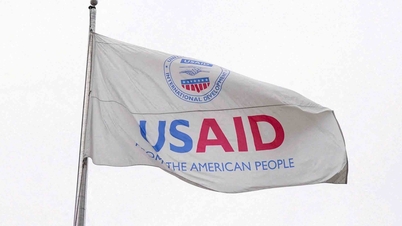

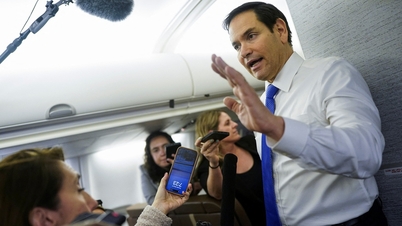



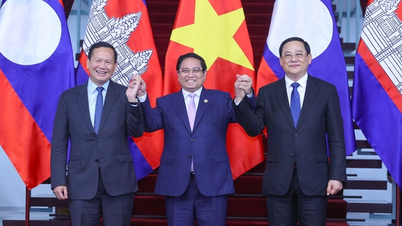


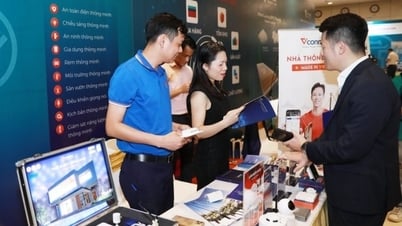

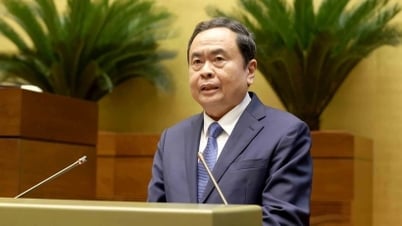
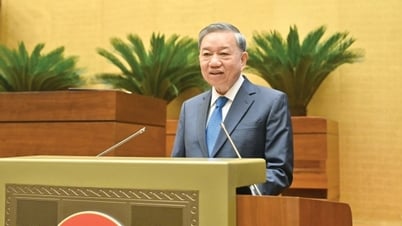
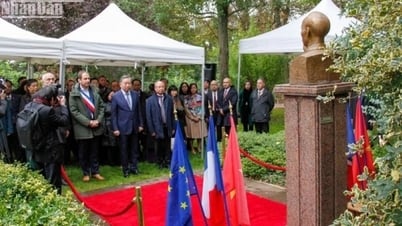
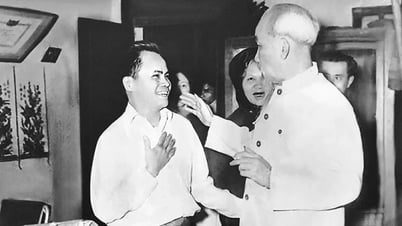
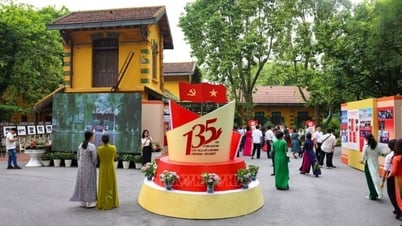




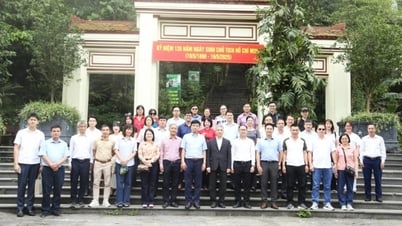
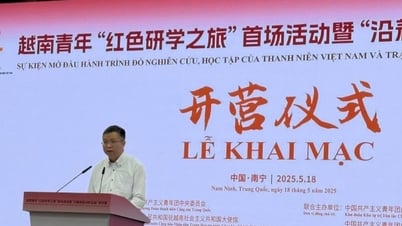
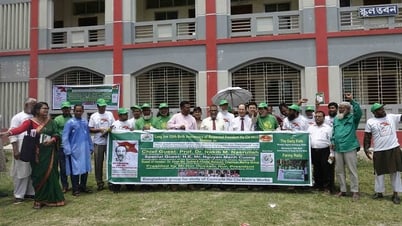
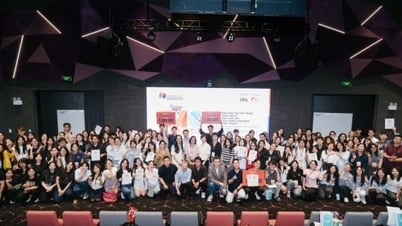
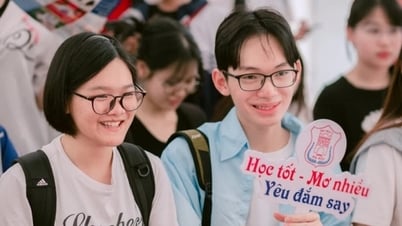
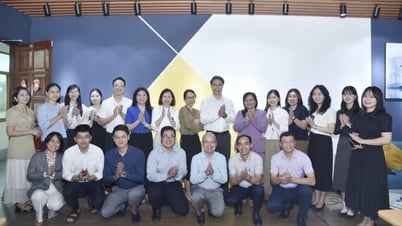
![[Photo] Prime Minister Pham Minh Chinh inspects the progress of the National Exhibition and Fair Center project](https://vphoto.vietnam.vn/thumb/1200x675/vietnam/resource/IMAGE/2025/5/19/35189ac8807140d897ad2b7d2583fbae)














































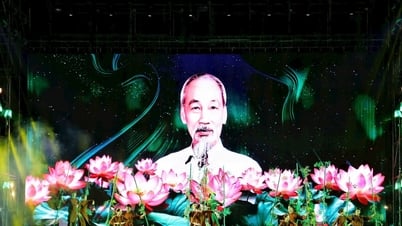

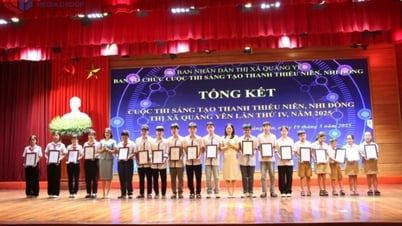




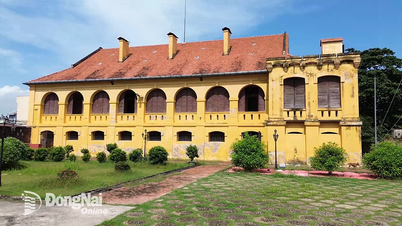




![[VIDEO] - Enhancing the value of Quang Nam OCOP products through trade connections](https://vphoto.vietnam.vn/thumb/402x226/vietnam/resource/IMAGE/2025/5/17/5be5b5fff1f14914986fad159097a677)





Comment (0)